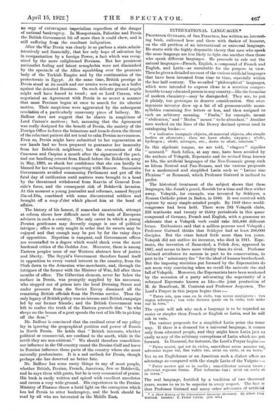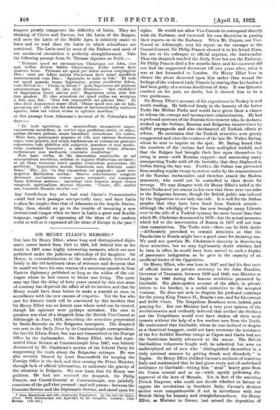INTERNATIONAL. LANGUAGES.* PROFESSOR Guksann, of San Francisco, has written an
interest. mg book, enlivened here and there with flashes of humour, on the old problem of an international or universal language. He starts with the highly disputable theory that men who speak the same language are less likely to fight one another than those who speak different languages. He proceeds to rule out the natural languagesāFrench, English, a compound of French and English, and Latināas unsuitable for the purpose in view. Then he gives a detailed account of the various artificial languages that have been invented from time to tune, especially within the last half century. The so-called "philosophical" languages, which were intended to express ideas in a notation compre- hensible to any educated person in any countryālike the formulae of modern chemistry--may be disregarded. They are, to put it plainly, too grotesque to deserve consideration. One over- ingenious inventor drew up a list of all pronounceable mono- syllables containing five letters or less, and then assigned to each an arbitrary meaning. " Pnabs," for example, meant " abdication," and " Mrolm " meant " to be abundant." Another man worked on the lines of the Dewey decimal system used in cataloguing books:
" a indicates inorganic objects, ab material objects, aba simple bodies or elements ; then we have ababa, oxygen ; a5abe, hydrogen ; ababi, nitrogen, etc., down to abate, osmium."
In this algebraic tongue, we are told, " efageco " signifies " mustard." Such follies, at any rate, have been avoided by the authors of Volapuk, Esperanto and its revised form known as Ido, the artificial languages of the Neo-Romanic group such as Idiom Neutral and Pan-Roman, and the various proposals for a modernized and simplified Latin such as " Latino sine Flexion " or Romanal, which Professor Gubrard is inclined to prefer.
The historical treatment of the subject shows that these languages, like Jonah's gourd, flourish for a time and then wither away. Volaptik, for example, was invented by Schleyer, a Roman Catholic priest in Baden, in 1880. It was received with rapture by many simple-minded people. By 1889 three world- congresses had been held. There were 283 Volapuk clubs, 316 textbooks and twenty or thirty periodicals in this queer compound of German, French and English, with a grammar so elaborate that a Volapuk verb could take 505,440 different forms. Enthusiasts said that a million persons used Volaptik ; Professor Guerard thinks that Schleyer had at least 200,000 disciples. But the craze lasted little more than ten years.
Volapuk did not outlive its inventor, who died in 1911. Espe- ranto, the invention of Za,menhof, a Polish Jew, appeared in 1887, and seems to have more vitality than its rival. Professor Gubrard attributes its success in part to its conservatism, in part to its " missionary fire " for the ideal of human brotherhood.
But the imposing statistics put forward by the Esperantists do not seem very convincing when we recall the meteoric rise and fall of Volapuk. Moreover, the Esperantists have been weakened by the secession of a party advocating the superiority of a reformed Esperanto known as Idoāthe joint production of M. de Beaufront, M. Conturat and Professor Jespersen. Tho Lord's Prayer in this jargon begins thus :-
" Petro nix, qua esas on la cielo, tua nomo santigesez ; tus regno advenez ; tua volo facesez qualo en In cielo, tale anke sur In tero."
The cynic will ask why such a language is to be regarded as easier or simpler than French or English or Latin, and he will ask in vain.
The various proposals for a simplified Latin point the truer way. If there is a demand for a universal language, it comes only from educated people, and they might learn Latin just as easily as any of the arbitrary corruptions of Latin which are put forward. In Romanal, for instance, the Lord's Prayer begins :- " Petro nostri, qui est in cieles, sanctificat estas nomino tui, advenias regne tui, fias volite tui, sicut en ciele, et en terre."
Yet to an Englishman or an American such a dialect offers no advantage as compared with the simple Latin of the Vulgate :- " Pater nester qui es in coelis ; sanctificetur nomen tuum adveniat regnum tuum. Fiat voluntas tua ; sicut on coelo et in terra."
The real language, fortified by a tradition of two thousand years, seems to us to be superior in every respect. The fact is that Professor Gubrard and many other advocates of artificial
ā¢ A Short History of the International Language Movement. By Albert Ikon Gutrard. London: T. Fisher Unwin. [21s. net.]
tongues greatly exaggerate the difficulty of Latin. They are thinking of Cicero and Tacitus, but the Latin of the Empire, still more the Latin of the Middle Ages, is infinitely easier to learn and to read than the Latin to which schoolboys are restricted. The Latin used by most of the Fathers and most of our mediaeval chroniclers is perfectly straightforward. Take the following passage from St. Thomas Aquinas on Faith :-
" Primum quod est necessaritun Christiano est fides, sine qua nullus dicitur fidelis Christianus. Fides autem tacit quatuor bona. Primum est quod per fidem anima conjungitur Deo : nam per fidem anima Christiana facit quasi quoddam matrimonium cum Deo : Sponsabo to mihi in fide.' Et inde est quod quando homo baptizatur, primo confitettur fidem, cum dicitur ei : Credis in Deum ? ' quia baptismus est primum sacramenttun fidei. Et ideo dicit Dominus : Qui crediderit et baptizatus fuerit salvus erit.' Baptismus enim sine fide
prodest. Et ideo sciendum est quod nullus eat acceptau a Deo sine fide. Sine fide impossibile eat placere Deo.' Et ideo dicit Augustinus super illud, Omne quod non est ex fide, peccatum est : ubi non est aeternae et incommutabilis veritatis agnitio, Jabot est virtus etiam in optimis moribus.' "
or this passage from Adamnan's account of St. Columba's last days :- " Et inde egrediens, at monticellum monasterio super- eminentem ascendens, in vertice ejus paululum stetit, et suns, ambas elevens pslmas, suum benedixit coenobium his verbis, Buie loco, quamquam angusto et viii, non tanttun Scotorum reges, cum populis, red etiam barbararum et exterarum gentium regnatores cum plebibus sibi subjectis, grandem et non medio- crem conferent honorem : a sanctis quoque etiam aliarum ecclesiarum non mediocris veneratio conferetur.'
Post haec verbs, de illo deseendens monticello, et ad monasterium revertens, sedebat in tugurio Psalterium scribens ; et ad ilium tricesimi tertii psalmi versiculum perveniens ubi scribitur, Inquirentes autem Dominum non deficient omni Bono,' Hie ' alt, ' in fine cessandum est paginae quae vero sequitur Baithereus scribat.' Sancto convenienter congruit decessori novissimus versus quem scripserit, cui nunquam 'bona deficient aetema : successori vero sequens segue versus congruit, spiritualium doetori filiorum, Venite, filii, audits me, timorem Domini docebo vex.' "
Any fourth-form boy who had read Caesar's Commentaries :could find such passages unexpectedly easy, and later Latin is often far simpler than that of Adamnan or the Angelic Doctor. Why, then, should we go to the trouble of inventing a new international tongue when we have in Latin a great and flexible language, capable of expressing all the ideas of the modern world as well as it expressed all the ideas of Europe in the past ?



































 Previous page
Previous page